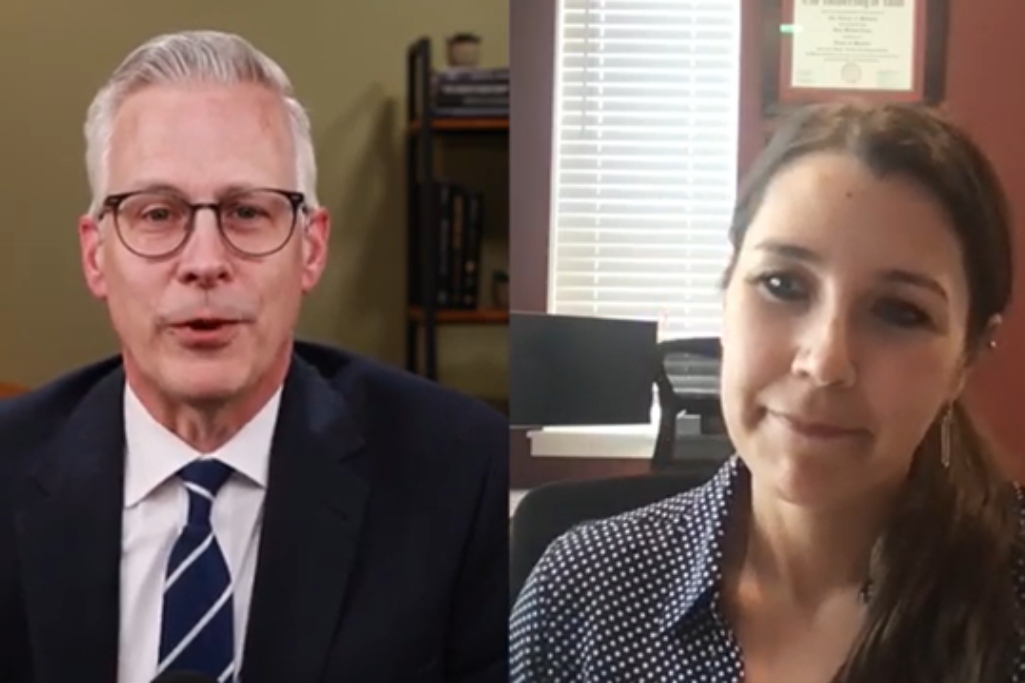
American Bible Society’s John Plake and Harvard University’s Kate Long discuss the intersection of faith and flourishing in an ABS podcast.
PHILADELPHIA (BP) — Scripture engagement, church involvement and an active faith increase human flourishing, the American Bible Society (ABS) said in its latest chapter of the State of the Bible utilizing Harvard University’s human flourishing index.
But the United States ranked 15th among 22 countries studied on Harvard’s Global Flourishing Index, trailing the top five countries of Indonesia, Mexico, the Philippines, Israel and Nigeria. The U.S. rose to 12th place when factoring in financial wealth.
Tyler VanderWeele, an architect of Harvard’s global human flourishing project, said participation in a religious community impacted results in all countries studied.
“Those who are attending services more than weekly report higher levels of flourishing,” he said of the findings included in Chapter 3 of State of the Bible: USA 2025, downloadable here. “Have we perhaps been neglecting important spiritual pathways to flourishing?”
John Plake, ABS chief innovation officer and State of the Bible editor-in-chief, references a scriptural connection in John 10:10, where Jesus indicates He has come that we might have full lives.
For the study, flourishing is defined as “the relative attainment of a state in which all aspects of a person’s life are good, including the contexts in which that person lives.”
Plake questions why the U.S. trails countries like Indonesia, Nigeria, Kenya and India in human flourishing.
“In these cultures, individuals commonly feel like they’re part of something much bigger than themselves,” Plake said in a video insight on the findings. “On the other hand, countries that scored lower like Germany, Sweden, Austria, the U.K. and the United States — we tend to be individualist cultures, where we focus more on personal achievement than on group cohesion and harmony.”
Conversely, Americans report feeling disconnected, lonely and dissatisfied, Plake said, and even express a lack of purpose. How can we flourish in the U.S. and similar places?
“State of the Bible research shows that people in the U.S. who are actively connected to a vibrant Christian community,” Plake said, “they tend to flourish much more than those who aren’t. We also see that those who are Scripture Engaged score significantly higher on human flourishing than those who are disengaged.”
Regardless of the global picture, Plake said those who engage in Scripture, connect with a faith community and actively live out their faith can flourish.
“This year we saw an encouraging uptick in flourishing overall and found high flourishing levels among Scripture Engaged Gen Z and Millennials,” he said. “These findings further support our research into the positive relationship between Bible engagement and holistic well-being.”
Among key findings in human flourishing:
- Practicing Christians score higher in human flourishing at 7.9 on a scale of 0-10, compared to non-Christians who score 6.8.
- Daily Bible users and those who are Scripture Engaged each score 7.9; those who never use the Bible and are not Scripture Engaged score 6.8.
- Prayer impacts human flourishing, with 39% of people who prayed in the past week reporting high human flourishing scores, compared to 25% of those who haven’t prayed in the past week.
- High human flourishing was observed in 43% of Americans who strongly felt God was active in their lives.
- Low human flourishing was observed in 41% of Americans who disagreed that God was active in their lives.
- Boomers enjoy the highest average human flourishing score at 7.5, significantly surpassing other generations.
- Gen Z and Millennials actively engaged in Scripture are flourishing, together averaging 8.1.
- Otherwise, Gen Z scores lowest in human flourishing at 6.8.
Harvard has studied human flourishing since 2017, focusing on six distinct ways in which people flourish, namely happiness and life satisfaction; mental and physical health; meaning and purpose; character and virtue; close social relationships; and financial and material stability.
This is the first year results of the global study were released, including the select countries of Argentina, Australia, Brazil, Egypt, Germany, Hong Kong, India, Indonesia, Israel, Japan, Kenya, Mexico, Nigeria, the Philippines, Poland, South Africa, Spain, Sweden, Tanzania, Turkey, the United Kingdom and the United States.
ABS offers a podcast on the intersection of faith and flourishing here, featuring Plake and Harvard Human Flourishing Program research associate Kate Long.
The State of the Bible is based on a nationally representative online survey of 2,656 adults in all 50 states and D.C., conducted Jan. 2 -21 for ABS by NORC at the University of Chicago, using its AmeriSpeak panel.
ABS will release additional State of the Bible chapters monthly through December, focusing on topics including trust in institutions and people, church engagement and behaviors toward friends and neighbors.
(EDITOR’S NOTE — Diana Chandler is Baptist Press’ senior writer.)


